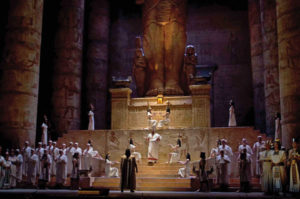
Opera Profile: Verdi’s Ode to Ancient Egypt, ‘Aida’
By Logan MartellPremiering on December 24, 1871, at the Khedivial Opera House in Cairo, Egypt, Giuseppe Verdi’s “Aida” is one of opera’s best-loved and most enduring works. Verdi was commissioned by Isma’il Pasha, who was governor of Egypt, in celebration of the opening of Egypt’s Khedivial Opera House, although the premiere was delayed due to complications from the temporary capture of Paris by Prussian forces. Verdi himself was not pleased that the premiere in Cairo was held mainly for the viewing of nobility, politicians, and critics; he considered the European premiere in La Scala, Milan on February 8, 1872, to be the true premiere where it could be seen by the public. Since then it has sparked a love amongst audiences that has led to “Aida” being produced worldwide to this current day.
Short Plot Summary
As war between the Egyptians and the Ethiopians looms ever closer, Ramfis, high priest of Egypt tells the young Radamès that the goddess Isis has chosen who shall lead the Egyptian army into battle. Radamès sings of his desire to be commander of the army, hoping to bring honor to himself and win the heart of Aida, the captured Ethiopian princess with whom he is in love. When a messenger announces before the court that the Ethiopian army is marching on Thebes, the king formally declares war and reveals that Radamès has indeed been chosen to command the Egyptian army. Aida sings of her conflicting feelings toward her lover for her father and country, and her love for Radamès.
Radamès has been victorious in battle, giving cause for music and celebration. Amneris, daughter of the Egyptian king, is love with Radamès, and suspects Aida to be as well. Amneris confirms her suspicion when she deceives Aida into believing that Radamès has died in battle, causing the Ethiopian princess to confess her love in grief. Infuriated, Amneris swears revenge upon Aida. When Radames returns from his victory, the king declares that he may have anything he asks for. Among the slaves captured in the battle is Amonasro, the Ethopian king. While the Egyptians call for the death of the captured slaves, Radamès asserts that he wishes for the slaves to be spared and set free. Impressed with his mercy, the Egyptian king makes Radamès his successor, effectively betrothing him to Amneris.
The night before the wedding between Radamès and Amneris, he meets Aida outside the temple of Isis to speak with her in private. Unbeknownst to him, Aida’s father has made her agree to have Radamès divulge the location of the Egyptian army. Radamès assures Aida that he will marry her, and she pleads with him to run away with her. As they plan their escape, Radamès mentions a hidden path, revealing the location of his army in the process. Amonasro comes out of his hiding place and reveals his identity as the Ethiopian king. At this moment Amneris and the high priest discover Radamès with the Ethiopian king and princess and summon the guards. While Amonasro and Aida beg Radamès to flee, he allows himself to be arrested by the guards.
Due to her love for Radamès, Amneris has him brought out of his prison cell and implores him to deny the charges of treason, as the penalty is death. Radamès refuses, taking comfort in the hope that Aida will soon reach her homeland. Radamès is soon after sentenced to execution by being buried alive. While Radamès waits for his death after being sealed in a dark vault, he soon discovers that Aida has been waiting for him in the vault so that she may die with her beloved. As Amneris cries and pleads with Isis to protect Radamès, the two lovers accept their sealed fate, and Aida dies in his arms.
Famous Musical numbers
Radamès’ aria in Act I, “Celeste Aida” has gone on to become one of the most popular selections for tenors worldwide, and serves to open the opera on a powerful note of hopeful love. This love, however, is not to last as Radamès and Aida find themselves saying farewell to the mortal world in the duet “O terra, addio” content to die, so long as they are together.
Watch and Listen
Here is a performance from San Francisco that features Luciano Pavarotti and Margaret Price. The production is emblematic of the epic qualities that this opera has with the appropriate staging.
Categories
Opera Wiki

